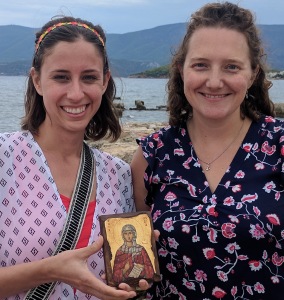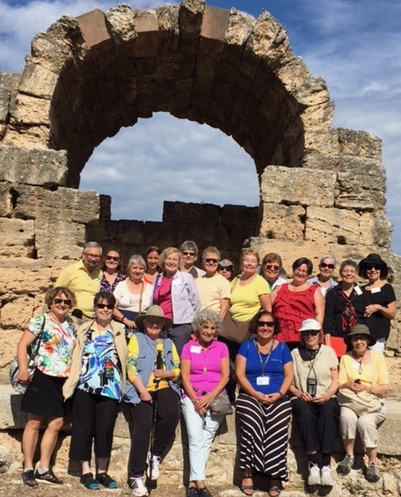By Sister Chris Schenk
I recently had the great joy of serving as educational director for a “Foremothers in the Faith” pilgrimage to sites in Greece where early Christian women had founding leadership roles.
Most people are completely unaware that women helped establish many of the earliest churches in Greece, Turkey and Rome. This is because church tradition always credits their founding to Paul. Early Christ-followers circulated and preserved Paul’s undisputed letters (circa 51-62 A.D.) and later, Luke’s Acts of the Apostles (circa 80-90 A.D.), both of which chronicle Paul’s missionary journeys in considerable — if sometimes differing — detail.

Many think that Paul established many of the earliest churches in Greece, but women had founding roles, too!
So, it’s understandable that later Christ followers thought Paul did it all. But he didn’t. In fact, Paul himself credits Prisca and her husband Aquila as his “coworkers in Christ Jesus, who risked their necks” for him (Romans 16: 3-5). He also describes two women–Euodia and Syntyche of Philippi—as coworkers who “struggled beside me in the work of the gospel” (Philippians 4:3).
Acts identifies Lydia of Philippi as beginning the first house church in that city (Acts 16:6-40), and Paul’s letter to the Philippians suggests that a disagreement between two women, Euodia and Syntyche, is threatening the unity of the church there (Philippians 4:2-3). According to well-known New Testament scholar, Sacred Heart Sister Carolyn Osiek, Euodia and Syntyche were very likely among the episkopoi and diakonoi, or leaders in the church, to whom Paul addresses his letter.

Jennie Mertens, left, and Jocelyn Collen hold an icon of Lydia of Philippi at the port of Cenchreae, hometown of Phoebe the diakonos in Romans 16:1-2.
In Thessaloniki and Berea, the Greek “leading women” supported Paul’s mission even as the male synagogue members ran him out of town (see Acts 17:1-15).
With 19 other “pilgrims” I visited archaeological ruins at Philippi, Thessaloniki, Corinth, Cenchreae, and Athens as well as assorted sites at Delphi, Meteora, and the lovely island of Aegina. My personal favorites were Corinth—where we honored the dynamic missionary duo Prisca and Aquila—and Cenchreae, where we held a prayer service honoring Phoebe, the leader of the church in that city (Romans 16:1-3).
Who were some of these women of Greece and what did they bring to the early church? Let’s explore the lives of two of them a bit more deeply to understand how they played a role in the church’s history, and could possibly impact the church’s future.
Prisca and Aquila’s house church at Corinth
Prisca and Aquila arrived in Corinth some nine years before Paul, and had already established a thriving tent making business when Paul came to the city. Tents and awnings were in great demand because every two years the Isthmian games, a festival of athletic and musical competitions, were held nearby. It is likely that the couple had also established an early Christian community that met in their “house church” (see photo). Here early Eucharistic meals were held and both Prisca and Aquila probably presided, as was customary at the time.

Pilgrims group in front of restored two-story structure at Corinth. It served as both a commercial establishment and a family dwelling and is probably quite similar to Prisca and Aquila’s tentmaker’s shop and “house church” in that city.
Paul first used their home as a base of operations for his mission in Corinth. It worked so well that he eventually took them to the cities of Ephesus (Acts 18:26-27) and later to Rome (Romans 16:3-5) to begin self-sustaining Christian house churches and centers of evangelization in those cities.
Four of the six times the couple is named in the scriptures, Prisca is named first (Romans 16:3; 2 Acts 18:18; Acts 18: 26; Timothy 4:19). Scholars surmise that she was more prominent in the Church than Aquila since it is highly unusual for women to be named in ancient writings, let alone named before their husbands. Her prominence makes her a great early example of women helping to lead the way!
Phoebe of Cenchreae
Paul’s letter to the Romans describes Phoebe of Cenchreae as a diakonos, and a benefactor, or prostatis. Scholars debate the exact meaning of diakonos in the first century but it carries connotations of leadership. In fact, it is a phrase Paul also uses for his own ministry (1 Cor 3:5, 2 Cor 6:4).
Paul’s commendation of Phoebe to the church of Rome tells us that she is the one who carried it to Rome on Paul’s behalf. He did not establish the church at Rome, and in his letter is seeking support from the followers in Rome for his new ministry to Spain (Romans 15: 24, 28). The long list of mutual acquaintances named at the letter’s end helps him establish his credentials with Roman Christ-followers.
Since most first century people didn’t read, when a letter arrived, the bearer read or “performed” it. So, Phoebe would have been the first to proclaim Paul’s beautiful text to the church in Rome. What an honor!

We can learn much about these early women from scripture!
The Church Today
Today there is great hope that Pope Francis’ special commission on female deacons will open the diaconate to women in the Catholic Church. If he does, tens of thousands of women ministers already serving our church will have the opportunity to be ordained and then preach at Mass, witness marriages, and baptize.
The Association of U.S. Catholic Priests, Voice of the Faithful, and FutureChurch are encouraging us to become educated and write to our bishops to advocate for women deacons.
It is time to recognize our church’s faithful women ministers who follow in the footsteps of their foremothers: Phoebe, Prisca, Lydia, Euodia, Syntyche, and countless, nameless others.
About the Author
 Sister Chris Schenk has worked as a nurse midwife to low-income families, a community organizer, a writer, and the founding director of an international church reform organization, FutureChurch. Currently she writes an award-winning column “Simply Spirit” for the National Catholic Reporter.
Sister Chris Schenk has worked as a nurse midwife to low-income families, a community organizer, a writer, and the founding director of an international church reform organization, FutureChurch. Currently she writes an award-winning column “Simply Spirit” for the National Catholic Reporter.
Sister Chris’s forthcoming book Crispina and Her Sisters: Women and Authority in Early Christianity details original research into iconic motifs of female authority found in early Christian art and archaeology. Published by Fortress Press, the book will be available in December, 2017.


So happy to see this come to fruition. You are doing great work. Blessings from another CSJ.
LikeLike
Thank you, Judith!
LikeLike
Very interesting! What an eye opener!
LikeLike
Thank you, Marge!
LikeLike
My eyes are opened to the possibility. I hope to see on my lifetime. Kudos to you for your efforts.
LikeLike
Thank you, Kathy!
LikeLike
Love the stories of our Foremothers in faith, great reminders of what was and of what might be.
LikeLike
Thank you!
LikeLike
Thank you! Looking forward to reading it.
LikeLike
Thanks Susan!
LikeLike